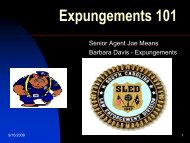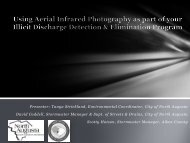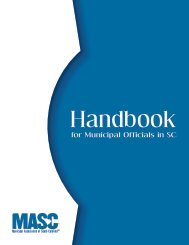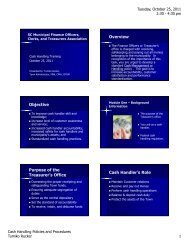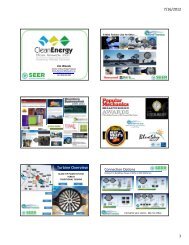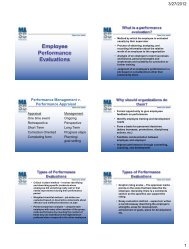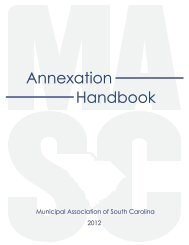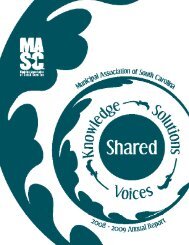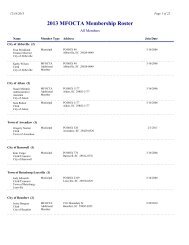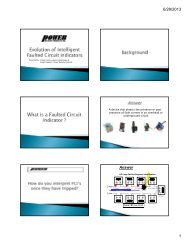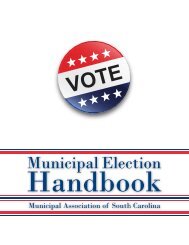January - Municipal Association of South Carolina
January - Municipal Association of South Carolina
January - Municipal Association of South Carolina
Create successful ePaper yourself
Turn your PDF publications into a flip-book with our unique Google optimized e-Paper software.
Legislative recap <strong>of</strong> the 116th session<br />
<strong>of</strong> the SC General Assembly<br />
The General Assembly adjourned on June 1 to end its 116th Session. The following is a brief summary <strong>of</strong> the<br />
key legislative issues <strong>of</strong> interest to business license <strong>of</strong>ficials and other municipal <strong>of</strong>ficials.<br />
Taxicabs<br />
Legislation regarding certification <strong>of</strong> taxicabs was signed<br />
into law on April 5, 2006, and amended Section 58-23-<br />
1240. The law calls for a sticker or metal plate to be affixed<br />
to the rear <strong>of</strong> a taxi. The dimensions <strong>of</strong> the plate or sticker<br />
must be approved by the municipality where the taxi principally<br />
operates. The law eliminates<br />
the requirement to change<br />
the color <strong>of</strong> the sticker annually. A<br />
taxi owner who qualifies as a self<br />
insurer must issue to the taxi operator<br />
a certificate <strong>of</strong> insurance.<br />
The certificate must remain in the<br />
taxi while it is in operation.<br />
Property Tax Reform<br />
Property tax reform was a hot issue last session. After debate<br />
lasting the length <strong>of</strong> the session followed by a constitutional<br />
amendment vote in November, the final result was<br />
a sales tax/property tax swap and a limit on property value<br />
increases during reassessment years.<br />
The tax swap involves exchanging a reduction in the property<br />
tax for school operations for an increase in the sales<br />
tax. Any surplus revenues could replace property taxes<br />
on owner- occupied homes for county operations. While<br />
municipal governments are not directly affected by the<br />
sales tax/property tax revenue swap, the increase in sales<br />
tax will increase operation costs, and the millage rate limits<br />
will create additional pressures for finding other revenue<br />
sources to fund the municipal services required by the<br />
local citizens. Local governments and school districts are<br />
not allowed to increase their millage rates more than the<br />
previous year’s Consumer Price Increase plus the percentage<br />
increase in population.<br />
A new property tax reassessment method limits property<br />
value increases during the years <strong>of</strong> reassessment to 15<br />
percent unless the property has been sold, transferred<br />
or had major improvements. If any <strong>of</strong> these events take<br />
place, the property values increase to the appraised value.<br />
Property tax reform was a hot issue<br />
last session ... the final result was a<br />
sales tax/property tax swap and a limit<br />
on property value increases during<br />
reassessment years.<br />
New construction must now be placed on the tax rolls<br />
upon receipt <strong>of</strong> a certificate <strong>of</strong> occupancy. Previously, new<br />
construction was not placed on the tax rolls until <strong>January</strong><br />
1 each year. In some cases, properties are occupied and<br />
receive the benefit <strong>of</strong> local government services for almost<br />
two years before the property tax is due.<br />
Counties may impose an additional<br />
sales tax if approved<br />
by a county-wide referendum.<br />
The additional revenues must<br />
replace property taxes on other<br />
classes <strong>of</strong> properties. During the<br />
property tax debate this year,<br />
legislators spent considerable<br />
time on the sales tax exemptions<br />
and caps, such as the $300 tax cap on automobile<br />
sales. A Sales Tax Exemptions Review Committee will look<br />
at all <strong>of</strong> the sales tax exemptions and provide a report to<br />
the General Assembly in 2007.<br />
Local Accommodations and Hospitality Taxes<br />
Legislation passed allowing municipalities and counties to<br />
use 20 percent <strong>of</strong> the local accommodations and hospitality<br />
tax revenues for operating costs <strong>of</strong> the tourism-related<br />
facilities. Approved uses include tourism-related buildings;<br />
tourism-related cultural, recreational, or historic facilities;<br />
beach access and re-nourishment, tourism-related lands<br />
and water access; highways, roads, streets and bridges<br />
providing access to tourism-related destinations; advertisements<br />
and promotions related to tourism development; or<br />
water and sewer infrastructure to serve tourism-related demand.<br />
Previously, only municipalities in counties collecting<br />
more than $900,000 in state accommodations tax funds<br />
were allowed to use any <strong>of</strong> the local accommodations and<br />
local hospitality taxes for operating and maintaining these<br />
tourism facilities and activities.<br />
Legislative continued on page 5<br />
3



